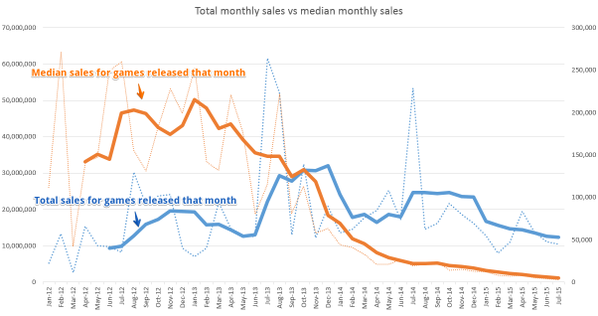- Joined
- Jan 28, 2011
- Messages
- 97,475















Lots of articles these days about the impending death of indie games on PC. Too much to copy-paste them all, but here's a summary:
Good reads:
The mathematical analysis that kicked off the meme: https://medium.com/@TonyPlaysGuitar/rat-race-to-the-steam-store-703ac031e41
A skeptical take: http://www.gamasutra.com/blogs/RyanClark/20150908/253087/The_5_Myths_of_the_Indiepocalypse.php
I'll quote this one: https://medium.com/@morganjaffit/indipocalypse-or-the-birth-of-triple-i-eba64292cd7a
The hot topic for independent developers these days is the so-called “indiepocalypse”. It’s the notion that indies are going to have an increasingly difficult time making a living now that mobile and Steam are both “flooded” with games. Indiepocalypse posts tend to focus on 5 key ideas:
- There is too much competition, especially now that so many games launch on Steam each week.
- Various charts are showing bad things, such as revenue per game declining.
- The App Store is a wasteland. Steam will now become a wasteland.
- A few high profile indie games have had weaker-than-expected launches lately. Surely this means that the apocalypse is upon us?
- Triple-I independent games are going to force indie budgets to rise inexorably, mirroring what happened with AAA.
Good reads:
The mathematical analysis that kicked off the meme: https://medium.com/@TonyPlaysGuitar/rat-race-to-the-steam-store-703ac031e41
A skeptical take: http://www.gamasutra.com/blogs/RyanClark/20150908/253087/The_5_Myths_of_the_Indiepocalypse.php
I'll quote this one: https://medium.com/@morganjaffit/indipocalypse-or-the-birth-of-triple-i-eba64292cd7a
Indipocalypse, or the birth of Triple-I?
I’ve been lucky enough to watch the games industry ebb and flow through a few different cycles now, and it’s clear we’re just about to embark upon a fresh transition. This time, it’s the indie space that’s changing, but a lot of these changes mirror the various twists the industry has taken in the past. More than anything though, it resembles the change we saw when the PC/Console game business of the late 90’s became the juggernaut we now call “Triple A Development” and in the process crushed everything else in sight.
There’s a lot of suggestions that we may be headed towards an “Indie Extinction Event” as the number of titles from known indie developers that fail to find their market increases. There was a time when simply getting on Steam was enough — but with the opening up of the Steam marketplace, that’s stopped being true.

Thanks to @Steam_Spy for the graph, and for the data that sparked the conversation.
I don’t think we are headed for an extinction event, although a lot will change.
Instead, I think we’re about to witness the birth of Triple-I development at a massive scale.
I got to watch the end of the 20 person team development methodology at Irrational and Relic, see Triple A up close and personal at Ubisoft and Pandemic, and then started Defiant Development and watched both the mobile gold rush (and the following mobile consolidation) and now the rise of PC/Console downloadable.
During the course of that development experience, and especially now that we’re guiding a studio through those waters, we keep an eye on the health of the markets we’re launching our games into.
There are many different ways to evaluate the overall health of any particular market, but the rule of thumb I use is simple. Are good games being released, while their developers go broke? If so, steer clear and change your approach.
In short, how many games are making back more than they cost, each month? How does that compare to the number of games that are turning up? How does that relate to quality? The console business stagnated quickly when the money started sliding to the top. In the late 90’s, most of the games in the top 20 in any month would have made back their development budgets (which tended to be in the few million dollar range), and a decent profit to boot. By 2005, game budgets had blown out to tens of millions — and more and more, only the top slots were making enough back to justify the spend.
That experience peaked with the GFC causing risk averse publishers to ditch anything that wasn’t a certified, guaranteed, sequel — and with franchises like Call of Duty making billion dollar opening weeks while the number three title for the week languished in obscurity. Development budgets went up, risk taking went way down, and any game that couldn’t sell 10m copies was cancelled before it was born.
Into the picture came indie + mobile gaming. Games with dramatically lower budgets (generally well under a million) made their creators millions overnight. Suddenly we were back to the 80s/90s — before I got into the industry. We were creating new Carmacks + Garriots left right and center. Young millionaires leaping off the back of titles that they’d developed on their own, or with tiny teams.
The mobile gold rush quickly ended. Big companies like Supercell used their mass to dominate the charts, and now the charts are not only pretty much locked out to independents, they’re also very stagnant. One title alone accounts for almost 10% of the money in mobile — and it’s been the same one for over a year.
There are two ways to make a profitable game for mobile these days — spend an absurd amount of money, or spend almost no money at all. The middle is rapidly getting pushed out. There are always exceptions (like the excellent Crossy Road) but it’s a long way from a gold rush these days. Most importantly, every single month good (and even great!) games fail to make back their development costs. Mobile is a hard place to do business.
That same wave is hitting Steam now, with some slightly different nuances. The whole of this year has been a frenzy of titles (and thanks to Steam Spy for providing hard numbers around this) but in amongst those frenzy of titles there have been hordes of good games that have failed to make their development costs back.
Most recently, Mike Bithell has followed up the huge success of Thomas Was Alone with Volume, which has sold in anything but. Despite a huge investment in the title, despite great press, despite everything — Volume does not reach the new bar for success on Steam.
So what does?
A quick glance over the charts in the last few months shows a number of big studio titles (GTAV, Metal Gear Solid V) sharing the top ten lists with games by independant studios. Far fewer of those are traditional “indie” games however — most of them have been developed by teams that look to me to be far more Triple-I.
What makes a Triple-I studio? Unlike Triple-A, which is defined by the ambition of the game released, I think Triple-I applies more to the ambition of the developer. If they’re a team of 10 or more, working full time jobs in a studio, yet controlling the development, funding, and publishing of their titles — then they’re Triple-I. It’s getting harder and harder for a couch-surfing solo developer to make the games that hit the mark on Steam.
There are some superb examples of that in the industry already — I’m not trying to suggest this has just begun overnight. Supergiant, Klei, Five Lives, Uber and The Astronauts are all examples of studios that embody Triple-I values, and in some cases have done for years.
We’re now in a situation where we see that the games that can make it on Steam are more and more often from mid sized independent developers than from individuals. That’s not going to end the gold rush on Steam, and it doesn’t mean we won’t see solo devs with amazing breakout titles. I just think those will be the exception from here out, not the norm.
As at the birth of AAA development, the bar is rising. Those who manage to keep rising with it will do well, but many will be left along the wayside. I expect to see a bunch more good titles that fail to hit their goals — and I expect to see other developers blaming that on the games, and ignoring the big shifts in the market until it’s too late, and their titles run straight into the same issues.
If things keep pace with the AAA transition, we should expect to see a lot of consolidation over the next few years — potentially towards publishers like Paradox, but I think it’s more likely that developers with commercial success (and free cash) will absorb other devs who’ve created critical hits that have failed to find their market.
Budgets will go up, but the willingness to take risks with those budgets will go down.
In the end, it’s not an Indipocalypse — but it is a coming storm. Those who weather it will emerge into a bigger, tougher indie market where only Triple-I will be good enough to survive.














